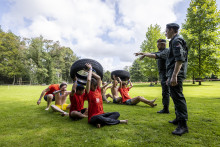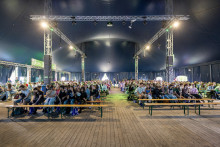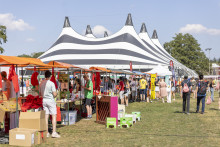The intention is that the next Kick-In, which takes place from Wednesday 24 August to Thursday 1 September, will look like it did before the corona crisis. ‘As far as we are concerned, it is a return to the old normal, with the 2019 edition as an example’, says Schakel. ‘So a completely physical introduction period, with many of the well-known elements that have always been well received, such as the Storming of the Bastille, the day in the city centre and the afternoon full of sports.’
A new look
The committee does keep a possible strictening of the corona measures in mind. ‘Of course, we hope it will not happen, but you have to keep it in mind. Fortunately, we can build on the experiences of the previous two committees. If necessary, there is still a plan B or C ready. But the assessment of participants showed that physical activities are rated higher than online ones.’
The program of the upcoming Kick-In will not be completely overhauled. ‘Of course, the theme will recur as a common thread. And we are giving some activities a new look. For example, we want to pay extra attention to diversity, with a Celebrate Our Differences Party for the bachelors and a Bring Your Flag Party for the masters. On the last day of the introduction, we have Do-group Battles. In addition to the Apollo Culture Festival on Thursday, we also offer a theatre evening on Sunday. This way, the cultural associations can show themselves better and in diverse ways: one day with workshops, the other day with performances.’
Support from project leader
The committee has deliberately chosen to not radically change the programme. This while, following a recent evaluation of the previous Kick-In, the University Council insisted on introducing recommendations, such as examining the length of the introduction period. ‘No, shortening is not a talking point this year. The Bachelor and Master Kick-In last nine days and five days respectively’, says Schakel. ‘These are recommendations that have been neglected for a few years due to the corona crisis. As a committee, we want to focus on the short term; the organization of the upcoming Kick-In. It is up to the steering committee to think about the long term.’
Another recommendation from the University Council has been implemented: The Kick-In committee is supported by a project leader. ‘Especially the past two committees had to contend with a high workload due to the corona crisis, partly because many questions came in’, says Schakel. ‘In theory, we as a committee are only responsible for the extracurricular program, not for the part of the study programmes. But in practice, you saw that things often got mixed up. Of course, as a committee, you want to answer all the questions that come in. After all, you are the face and the point of contact of the Kick-In. But the support is certainly welcome and will undoubtedly help us.’
Boost the rating of the Master Kick-In
What also arose from the evaluation, was a relatively low assessment of the Master Kick-In. While the bachelor’s students rated the introduction period with a relatively high grade (a 7.9), the Master Kick-In only received a 6.7. Boosting that rating is one of the focal points, says Schakel.
According to her, the stumbling stone for the Master Kick-In is the do-group parents. ‘The enthusiasm has been somewhat lower in recent years, which resulted in fairly large do-groups. While we know that master's students are mainly looking for a small-scale and personal contact. If we make the do-groups smaller and more programme-related, as with the bachelors, I think we can make a big difference.’
That is why the committee wants more publicity for the master do-groups. ‘We are now entering the recruitment phase,’ says Schakel. ‘In May we will have a reunion for the do-group parents and participants of the last Summer and Winter Kick-In. We want to show that do-group parenting for the Master Kick-In is just as much fun as with the bachelors.’







